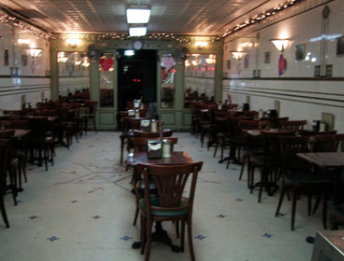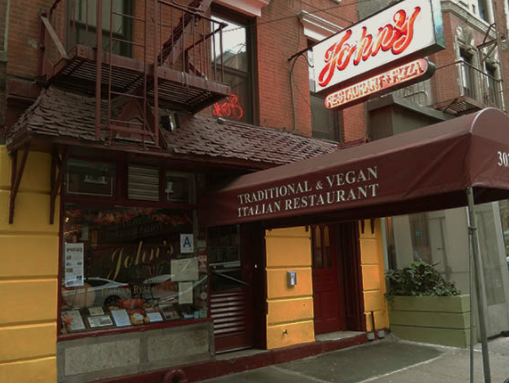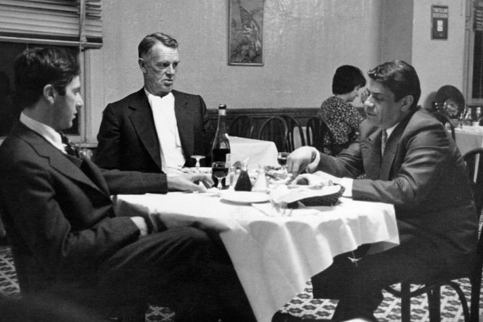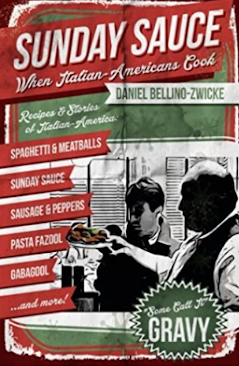Sunday, September 24, 2023
Friday, September 8, 2023
New York Italian Mafia Restaurants
ROCCO'S
Now CARBONE
All that's left of the old Rocco's Restaurant on Thompson Street in Greenwich Village is the old Neon Sign which now has CARBONE plastered over where it used to say ROCCO .. ROOCO'S was one of the last few remaining Old-School Italian Red Sauce Joints left in downtown Manhattan. It was there on Thompson Street in Greenwich Village for some 70s years until the owners were forced-out by a Skyrocketing Rent Increase that they could not afford. Rocco's was replaced by CARBONE, a place that charges $56 for Veal Parm when the average price around the city for VP is $27 elsewhere. ..
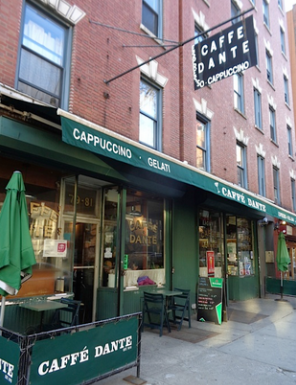
CAFFE DANTE
Caffe Dante was a Favorite of The late "JIMMY LOLLIPOPS" "VINNY THE CHIN GIGANTE" and other local Mobsters ... Dante opened in 1915, and sadly closed its doors on its 100th Year Anniversary in 2015. .
LANZA'S Since 1904
The same year my Grandparents Giuseppina & Fillipo Bellino came to New York
from LERCARA FRIDDI SICILY ....
.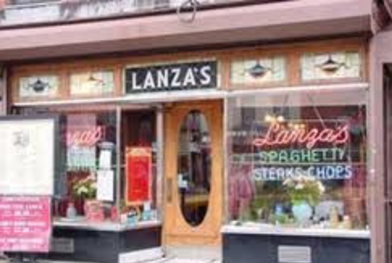
LANZA'S
SINCE 1904
.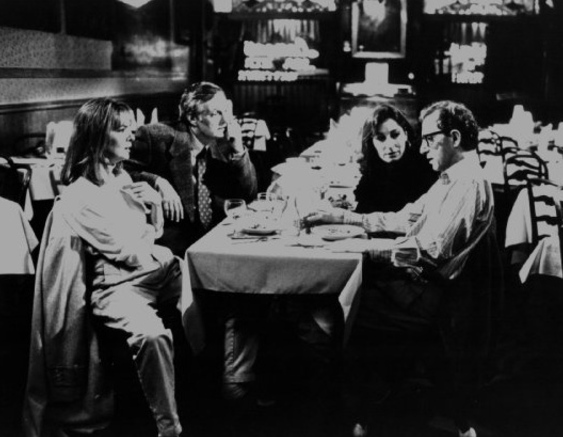

ROBERT DeNIRO in LANZA'S Shooting a scen for ANGEL HEART
.

DeNIRO as LUCIFER
at LANZA'S with EGG
.
MICKEY ROURKE with ROBERT DeNIRO at LANZA'S
LUCIFER'S EGG SCENE in the Motion Picture ANGEL HEART
Starring MICKEY ROURKE & LISA BONNETT
.

Joseph Socks
.
Michael Lanza

DeRobertis Pastry Shop
1st Avenue , New York NY
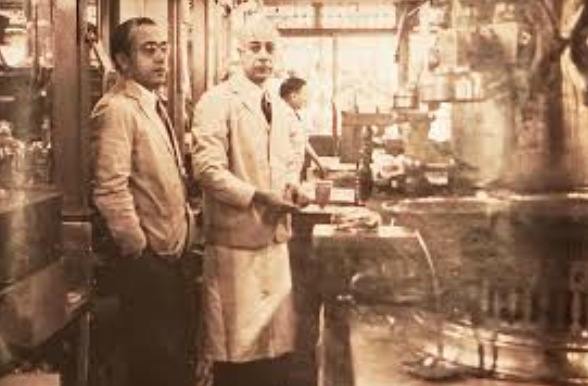
Inside DeROBERTIS PASTRY SHOP
A Favorite of Charles "Lucky" Luciano , Joseph "Socks" Lanza , Carmine "Lilo" Galante , and numerous other Mobsters over the years.
We’ve already established that the mafia in the East Village liked their Cannolis and their veal scallopini. This next bit of history is is consistent with that pattern. Lanza’s Restaurant, located at 168 1st Avenue in a tenement built in 1871, was opened in 1904 by Sicilian-Italian transplant Michael Lanza. It is rumored that in Italy he had been chef to King Victor Emmanuel III. And this regal influence is definitely apparent in the kitschy interior of large painted murals of places like Mount Vesuvius and the stained glass windows. These elements, along with the tin ceiling, are all original or very close to it. Also original to this turn-of-the-century throwback: the customers. According to an interview done by Eater, 90% of the patrons are long time regulars.Inside DeROBERTIS
Sadly closed in 2015 , after more than 100 Years serving Italians, normal citizens and Gangsters for so many years.
.JOHN'S
East 12th Street New York , NY
NOTE : JOHN'S is still in Business and Not Part of LOST ITALIAN NEW YORK
.
MOB BOSS
CHARLES "LUCKY" LUCIANO
.
Luciano grew up in the East Village (LES) of New York where he immigrated to with his parents at the age of 9 , from LERCARA FRIDDI SICILY, the same town the SINATRA FAMILY and Best Selling Italian-Cookbook Author DANIEL BELLINO "Z" hail from. And coincidentally Daniel Bellino worked as a Waiter / Bartender for 7 years when he was in his 20s ...
Luciano frequented both JOHN'S and LANZA'S Italian Restaurants which have been around since the early 1900s. He also ate at Brunetta's on 1st Avenue as well as the former La FOCACCERIA on the same block. La FOCACCERIA was a SICILIAN restaurant that sold Sicilian Specialties like (opened til 2010) the beloved sandwich of PALERMO called Pane Milza (Vastedda) along with Panelle, Arancini (Rice Balls) and Sfingione which is the true Sicilian Pizza ....
RECIPES FROM MY SICILIAN NONNA
by Daniel Bellino "Z"
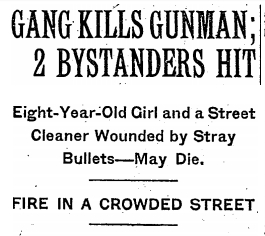

Above : NEW YORK TIMES HEADLINE of LUCIANO GENOVESE VALENTI SHOOTING
in Front of JOHN'S Italian Restaurant on East 12th Street
.

Well Dressed Gunmen:
Vito Genovese and Lucky Luciano
On August 11th 1922 Umberto Valenti was having a plate Chicken Parmigiana. Some time around noon, Valenti and six laughing companions emerged from their lunch at John's on East 12th Street. Walking eastward when smiles turned into frowns. Suddenly, Valenti spooked and bolted towards Second Avenue as two slick, well-dressed gunmen whipped out revolvers and fired. Gangland legend holds that one of the shooters was none other than Charles "Lucky" Luciano, Masseria's newest protégé was future Geovese Crime Family Boss Vito Genovese. The Chain of Evenets Follows : 1.Umberto Valenti emerges from John’s of 12th Street. Lucky Luciano and another assassin open fire. 2. Valenti draws a revolver and is hit in the chest with a bullet. He staggers to a waiting taxicab and dies. 3. The gunmen shoot two innocent bystanders before disappearing into a tenement. "It was the coolest thing I ever saw. People were shrieking and running in all directions, and this fellow calmly fired shot after shot. He did not move until he had emptied his weapon. With blood spurting from his clothing, Valenti tried to raise up his pistol but his wounds prevented him from doing so. He made for a waiting taxicab, collapsing on the Northwest corner of 12th Street."Click Here o READ The NEW YORK TIMES ARTICLE from 1922

CHICKEN PARM at JOHN'S
. .UMBERTO'S CLAM HOUSE
Mulberry Street LITTLE ITALY NEW YORK
.MOB BOSS "CRAZY JOE GALLO" was Whacked at UMBERTO'S on April 8 , 1972
Gallo had arrived at Umberto’s shortly after 5 a.m. and, according to witnesses, was loud and happy. The party ordered house specialties such as scungilli, calamari and mussels. Wine was brought to the table. Besides the Gallo party, there were nine other customers in the restaurant, which opened three weeks ago. The gunman entered through a side door and went directly to behind Gallo’s table. The man, described as about 5-foot-8, stocky, about 40 years old and with receding dark hair, fired twice, striking Gallo in the left shoulder and, as the hood fell over, in the left buttock. Diapioulas drove for cover but was also hit in the buttock. The killer calmly turned and walked out into Mulberry St. to a waiting car. Diapioulas apparently fired three times at the gunman. Other Gallo hoods ran to the street and began blasting at the car as it sped away. .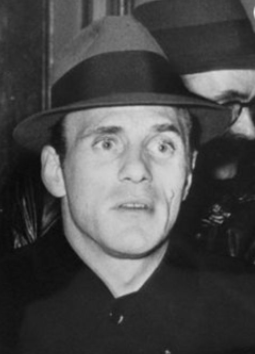
GALLO
."GET THE VEAL, it's the Best in the CITY"
AL PACINO , Sterling Hayden , and AL LITTERI
at LOUIE'S RESTAURANT in The BRONX
.The Restaurant used as LOUIE'S RESTAURANT in The GODFATHER
was The Old LUNA'S RESTAURANT on White Plains Road
. . Italian restaurants have been thriving for so long in New York City, it seems strange to imagine a time when there were none. That was just before Enrico & Paglieri opened on West 11th Street off Sixth Avenue. “Countless people’s first Italian table d’hote meal was had here at this proudly immaculate place which, going and growing since 1908, now takes the underparts of three brownstone houses,” states 1948 restaurant guide Knife and Fork in New York. .
Learn How to Make SALSA SEGRETO
The RECIPE is in SEGRETO ITALIANO
.SUNDAY SAUCE
WHEN ITALIAN-AMERICANS COOK
.
Sunday, July 23, 2023
Neapolitan Ragu History and Recipe Italian Gravy
Ragu Napoletana
GENARO CATALDO
"WHAY am I COOKING So GOOD" ??? !!!
Friday, April 14, 2023
Are You Making SUNDAY SAUCE this Sunday
Monday, March 27, 2023
Brief History of Italian New York NY NYC
The first Italian to reside in New York was Pietro Cesare Alberti, a Venetian seaman who, in 1635, settled in the Dutch colony of New Amsterdam that would eventually become New York. A small wave of Protestants, known as Waldensians, who were of French and northern Italian heritage (specifically Piedmontese), occurred during the 17th century, with the majority coming between 1654 and 1663. A 1671 Dutch record indicates that, in 1656 alone, the Duchy of Savoy near Turin, Italy, had exiled 300 Waldensians due to their Protestant faith.
The largest wave of Italian immigration to the United States took place in the late 19th century and early 20th century. Between 1820 and 1978, 5.3 million Italians immigrated to the United States, including over two million between 1900 and 1910. Only Irish and Germans immigrated in larger numbers.
The first New York neighborhood to be settled by large numbers of Italian immigrants – primarily from Southern Italy (mostly from Sicily) – was East Harlem, which became the first part of the city to be known as "Little Italy". The area, which lies east of Lexington Avenue between 96th and 116th Streets and east of Madison Avenue between 116th and 125th Streets, featured people from different regions of Italy on each cross street, as immigrants from each area chose to live in close proximity to each other.
"Italian Harlem" approached its peak in the 1930s, with over 100,000 Italian-Americans living in its crowded, run-down apartment buildings. The 1930 census showed that 81 percent of the population of Italian Harlem consisted of first- or second- generation Italian Americans. This was somewhat less than the concentration of Italian Americans in the Lower East Side’s Little Italy with 88 percent; Italian Harlem’s total population, however, was three times that of Little Italy. Remnants of the neighborhood's Italian heritage are kept alive by the Giglio Society of East Harlem. Every year on the second weekend of August, the Feast of Our Lady of Mount Carmel is celebrated and the "Dancing of the Giglio" is performed for thousands of visitors.
After World War II, the original Italian settlements such as East Harlem declined as Italian Americans moved to the North Bronx, Queens and Brooklyn's southern tier. The geographic shift coincided with a new wave of Italian immigration. An estimated 129,000 to 150,000 Italian immigrants entered New York City between 1945 and 1973. Bypassing Manhattan, they settled in Italian American neighborhoods in the outer boroughs and helped reinvigorate Italian culture and community institutions. With the influx of postwar immigrants, Bensonhurst became the largest Italian community in New York City, with 150,000 Italian Americans in the 1980 census.
The best-known "Little Italy" in Manhattan is the area currently called that, which centers around Mulberry Street. This settlement, however, is rapidly becoming part of the adjacent Chinatown as the older Italian residents die and their children move elsewhere. As of the 2000 census, 692,739 New Yorkers reported Italian ancestry, making them the largest European ethnic group in the city. In 2011, the American Community Survey found there were 49,075 persons of Italian birth in New York.



